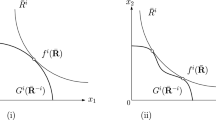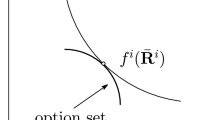Abstract
We construct a simple mechanism that can be used in situations when a group of well informed agents try to cooperate in the production and allocation of a good with external effects. We start by auctioning the right to have the initiative in the negotiation, then the winner proposes an allocation that is implemented if the rest of the players unanimously accept it. In case of a rejection, the process is started again. We show that the outcome of any stationary subgame perfect Nash equilibrium leads to an efficient allocation of the good with externalities, together with an equal split of the surplus that cooperation generates.
Similar content being viewed by others
References
Bag PK (1997) Public goods provision: applying Jackson–Moulin mechanism for restricted agent characteristic. J Econ Theory 73:460–472
Bag PK, Winter E (1999) Simple subscription mechanisms for excludable public goods. J Econ Theory 87:72–94
Crawford V (1979) A procedure for generating pareto efficient egalitarian-equivalent allocations. Econometrica 47:49–60
Eyckmans J (1997) Nash implementation of a proportional solution to international pollution control problems. J Environ Econ Manage 33:314–330
Gul F (1989) Bargaining foundations of shapley value. Econometrica 57:81–95
Hart S, Mas-Colell A (1996) Bargaining and value. Econometrica 64: 357–380
Jackson M, Moulin H (1992) Implementing a public project and distributing its costs. J Econ Theory 57:125–140
Kleindorfer P, Sertel M (1994) Auctioning the provision of an indivisible public good. J Econ Theory 64:20–34
Krishna V, Serrano R (1995) Perfect equilibria of a model of N-person non-cooperative bargaining. Int J Game Theory 24:259–272
Maniquet F (2003) Implementation of allocation rules under perfect information. Soc Choice Welf 21:323–346
Moldovanu B (1996) The provision and cost-sharing of an excludable public good. Econ Theory 7:531–539
Moore J, Repullo R (1988) Subgame perfect implementation. Econometrica 56:1191–1220
Mutuswami S, Pérez-Castrillo D, Wettstein D (2004) Bidding for the surplus: realizing efficient outcomes in economic environments. Games Econ Behav 48:111–123
Mutuswami S, Winter E (2004) Efficient mechanisms for multiple public goods. J Public Econ 88:629–644
Pérez-Castrillo D, Wettstein D (2001) Bidding for the surplus: a non-cooperative approach to the shapley value. J Econ Theory 100:274–294
Rubinstein A, Wolinsky D (1985) Equilibrium in a market with sequential bargaining. Econometrica 53:1133–1150
Shapley L (1953). A value for n-Person games. In: Kuhn H, Tucker AW (eds). Contributions to the theory of games. Princeton University Press, Princeton, pp 307–317
Varian H (1994) A solution to the problem of externalities when agents are well-informed. Am Econ Rev 84:1278–1293
Author information
Authors and Affiliations
Corresponding author
Rights and permissions
About this article
Cite this article
Porteiro, N. An Efficient and Egalitarian Negotiation Procedure for Economies with Externalities. Soc Choice Welfare 28, 19–40 (2007). https://doi.org/10.1007/s00355-006-0156-5
Received:
Accepted:
Published:
Issue Date:
DOI: https://doi.org/10.1007/s00355-006-0156-5




